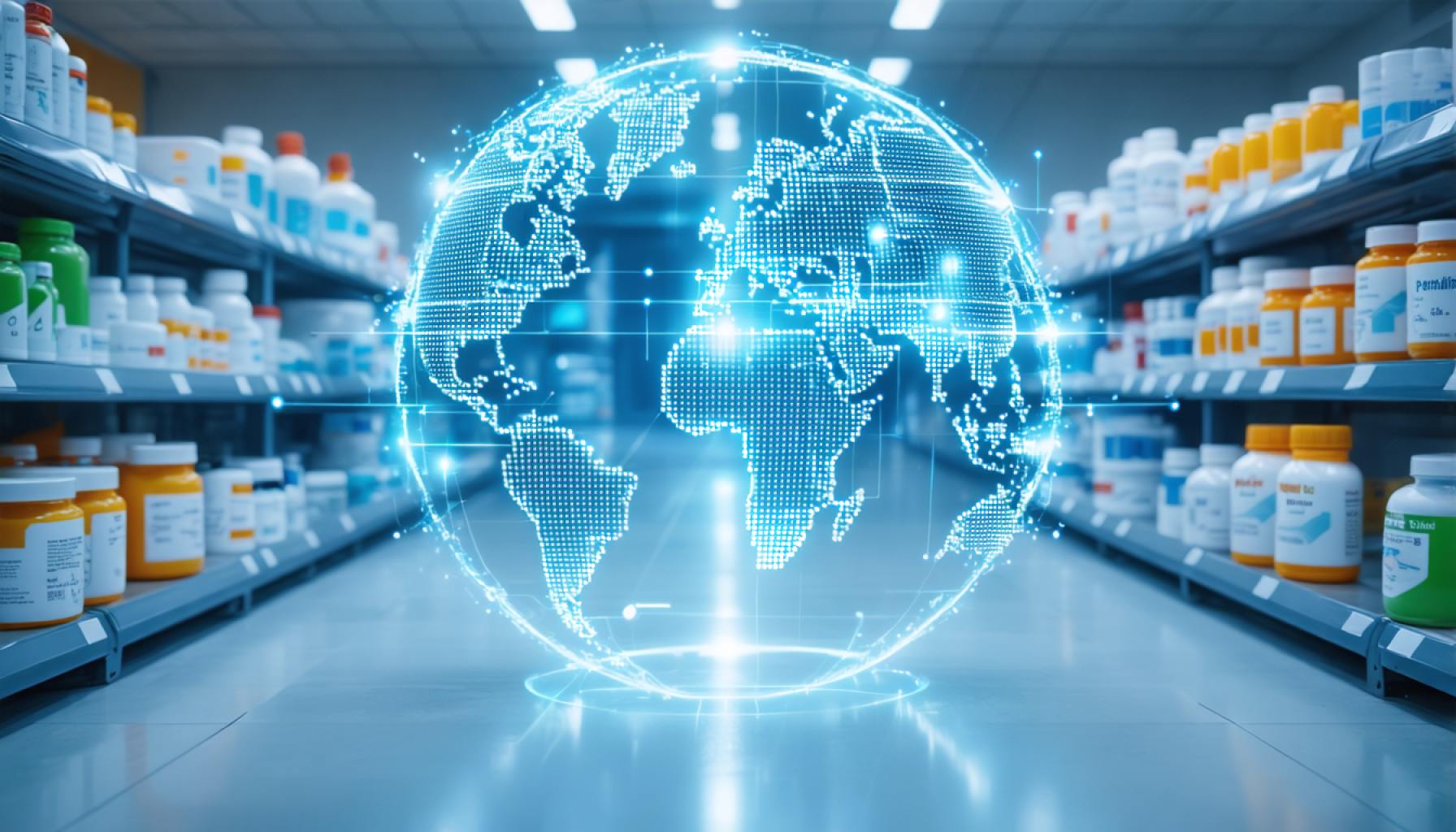- Blockchain technology is transforming the pharmaceutical supply chain by enhancing security and transparency.
- The market is projected to grow at a 11.5% CAGR, reaching $7.3 billion by 2034.
- Blockchain offers a solution for drug traceability, significantly reducing the risk of counterfeit drugs.
- Key benefits include increased efficiency, simplified inventory management, and cost savings for pharmaceutical companies.
- Industry giants like IBM, Oracle, and SAP, along with startups like MediLedger and FarmaTrust, are integrating blockchain into their systems.
- Challenges include regional regulations and technological compatibility, but strategic alliances could help overcome these hurdles.
- The adoption of blockchain is a global trend, affecting supply chain operations worldwide.
- This technological advancement represents not just an evolution but a revolution in pharmaceutical logistics, ensuring the future of health delivery is more transparent and efficient.
The intricate dance of pharmaceuticals traversing the global map is often clouded by inefficiencies and opacity. Yet, within this complexity lies a transformative force—blockchain technology—that promises to reshape the pharmaceutical supply chain. This burgeoning market is projected to surge at a compelling compound annual growth rate (CAGR) of 11.5%, soaring from $2.5 billion in 2024 to a staggering $7.3 billion by 2034.
Blockchain, with its roots in cryptocurrency, is swiftly becoming an essential tool in pharmaceutical logistics. Its capability to maintain a secure, transparent ledger holds immense potential to combat rampant issues such as counterfeit drugs, which not only plummet financial profits but even risk human lives. With each transaction immutably recorded, this technology assures all stakeholders—manufacturers, distributors, hospitals, and retailers—of the journey their products undertake.
More than just an illusion of security, blockchain offers a robust solution for drug traceability, making it nearly impossible for counterfeit products to infiltrate legitimate supply channels. This is crucial in an industry where trust is paramount. Each step along the chain can be validated, ensuring that from production to patient, every process is genuine.
Beyond security, blockchain enhances efficiency and transparency. It simplifies inventory management and ensures optimal resource allocation, streamlining operations across the board. For pharmaceutical companies, this translates into cost savings, faster deliveries, and ultimately, greater patient satisfaction.
Key industry players are vigorously adapting to this shift. Giants like IBM, Oracle, and SAP are embedding blockchain into their systems, charting a path for smaller companies and disruptors such as MediLedger, FarmaTrust, and Chronicled to drive innovation further. Each entity navigates the possibilities this technology brings, equipping themselves with new tools to cater to an evolving market landscape.
This drive is not unmarked by challenges. A mosaic of regional regulations, technological compatibility, and the sheer scale of the pharmaceutical supply chain poses significant hurdles. However, the potential rewards are too substantial to ignore, and strategic alliances may just be the remedy required to unlock blockchain’s full potential.
This transition is not isolated; it signals a broader momentum across the supply chain landscape worldwide—adoption stretching from North America to emerging markets across Africa and the Middle East. As more industries warm to blockchain’s potential, a ripple of innovation promises to redefine market dynamics on a global scale.
As pharmaceutical companies continue to grapple with complex logistics and regulatory challenges, adopting blockchain signals not just an evolutionary step, but a revolutionary leap. The message is clear: in the convergence of technology and pharmaceuticals lies not just opportunity, but a necessity—the future of health intrinsically tied to the clarity and efficiency blockchain provides.
How Blockchain is Revolutionizing the Pharmaceutical Supply Chain
The pharmaceutical industry is on the brink of a major transformation driven by blockchain technology. This innovation addresses the industry’s age-old problems of inefficiency and lack of transparency, particularly concerning pharmaceutical supply chains. With the surge in its market value from $2.5 billion in 2024 to a projected $7.3 billion by 2034, blockchain is set to redefine how drugs move from manufacturers to patients.
Key Features and Advantages
1. Combatting Counterfeit Drugs:
Counterfeit drugs pose a significant threat to both patient safety and financial profits. Blockchain ensures the authenticity of pharmaceuticals by creating an immutable ledger of each transaction, making it extremely difficult for fake products to enter the legitimate supply chain.
2. Enhanced Transparency and Security:
Blockchain offers a transparent platform where all stakeholders, from manufacturers to retailers, have access to a secure, verifiable record of the drug’s journey. This traceability ensures compliance and builds trust across the entire supply chain.
3. Efficiency in Operations:
By providing detailed, real-time data on drug inventories, blockchain helps simplify inventory management and resource allocation. Pharmaceutical companies can achieve cost savings through streamlined logistics and quicker delivery times, ultimately enhancing patient satisfaction.
Challenges and Solutions
Despite its benefits, the integration of blockchain in pharmaceutical supply chains faces several challenges:
– Regulatory Compliance: The pharmaceutical industry is subject to strict regulations which vary by region. Navigating this legal landscape requires significant adaptation and collaboration with regulatory bodies.
– Technological Alignment: Ensuring blockchain systems are compatible with existing technologies can be complex. Investments in developing interoperable frameworks are essential.
Industry Trends and Predictions
Major corporations like IBM, Oracle, and SAP are leading blockchain adoption efforts, inspiring smaller entities like MediLedger, FarmaTrust, and Chronicled. These companies are at the forefront of blockchain integration, equipped with new tools to push innovation further.
As blockchain adoption spreads across North America, Africa, and the Middle East, its influence on global market dynamics intensifies. The shift not only represents an evolution in pharmaceuticals but echoes transformative potential across various industries worldwide.
Real-World Use Cases
– Drug Traceability Networks: Pharmaceutical companies can create robust traceability networks, ensuring that drugs reaching consumers are authentic and safe.
– Supply Chain Optimization Tools: Blockchain aids in developing tools to optimize supply chains, reducing wastage, and lowering the carbon footprint of pharmaceutical logistics.
Pros and Cons Overview
Pros:
– Offers unmatched security and traceability
– Enhances operational transparency and efficiency
– Streamlines regulatory compliance by providing accurate, real-time data
Cons:
– High initial set-up and integration costs
– Complex regulatory landscapes vary by geographic region
– Interoperability issues with existing systems
Actionable Recommendations
For pharmaceutical companies looking to harness blockchain technology:
1. Collaborate with global regulatory agencies to navigate compliance more effectively.
2. Align existing IT infrastructure with blockchain systems to ensure seamless integration.
3. Leverage partnerships with leading tech companies to tap into their blockchain expertise.
In conclusion, blockchain technology offers a revolutionary leap for the pharmaceutical supply chain, providing an indispensable opportunity for growth and innovation. Embracing this technology means securing a competitive edge in an increasingly transparent and efficiency-driven market landscape.
For further insights into blockchain innovation, visit IBM, Oracle, and SAP.











